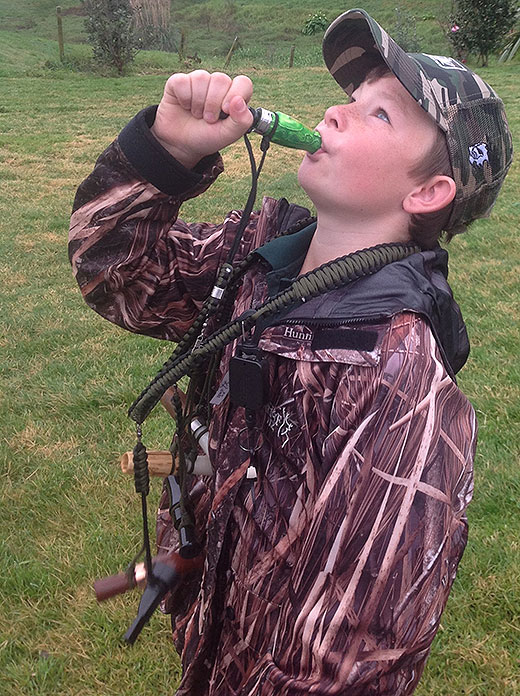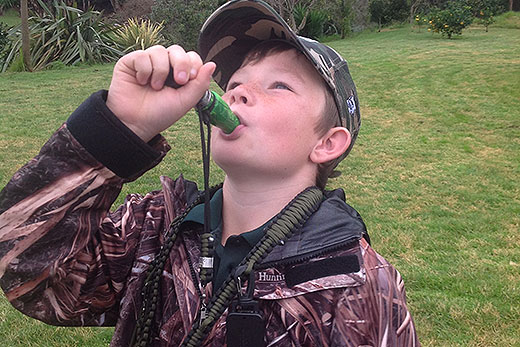Tauranga's Luke Spargo has got his camo gear and duck caller at the ready for 2pm tomorrow. But not for the reason you think.
The 10-year-old will be the youngest competitor in the grand final of the New Zealand Duck Calling Championships at clay target shooting range Loaded NZ, near Tauranga.
Tauranga's Luke Spargo getting in some practice ahead of tomorrow's New Zealand Duck Calling Championships at Loaded NZ.
Luke is one of 24 nationwide finalists hoping to quack the competition out of the water with a distinct duck call routine that will echo around the region.
'This is the first time we've had the competition in the North Island. It's always been part of the winter festival in Queenstown,” says organiser Adam Rayner.
'This year the past organiser asked me to organise it. And with me living here in Tauranga, it's the best place to hold it.”
The competition began with 21 regional rounds the country from about April to June – between duck shooting season. Because 'most people who go duck shooting don't want to do anything apart from shoot ducks”.
This left 24 competitors, with roughly half from the North and half from the South Island.
Adam says Luke is the youngest to compete tomorrow and will take on guys aged in their 50s and 60s from all walks of life 'from businessmen to hunters”.
And he's got some stiff competition. Well-known junior champ, 14-year-old Holly Irvine from Richmond near Nelson, will be calling – as will seasoned duck calling veterans including Wanaka's Hunter Morrow, who placed fifth in the world champs last year.
'He's no way near in the league of these top guys – but he's giving it a go.”
'And if he can blow a duck caller really well when he's 20 that would be great.”
So is there a knack to blowing a duck caller?
Adam says that a duck caller is in fact a wind instrument, and as such requires practice to perfect the differing calls 'using your tongue right and breathing properly”.
Anyone can pick up a duck caller and make noise but it takes a great deal of skill to produce the sounds that resemble live ducks, says Adam
'With a duck caller you've got the use of your diaphragm, the use of your tongue and inflection – so how much air you do and don't put in – when you put the air in – so you can do a whole range of different sounds and get the call to work,” says Adam.
'So it's not something you can pick up – Luke's only just started using a duck caller this year.
'He's natural talent at a lot of things and one of them using air properly from his lungs, so he can work a duck caller pretty well.”

Luke and his brother Cole Rayner, 9, went with Adam duck hunting for the first time last year. This year, their younger brother Matthew, 7, has joined in.
'They all got off-the-shelf duck callers last year. This year they've all got custom-made acrylic duck callers,” says Adam.
Luke was keen to enter this competition – and he uses Adam's duck call. 'He just jumped at the opportunity. And now he's shooting as well.”
Tomorrow's finalists will blow a duck call routine, which will be judged. Adam says two types of duck calling world championships exist – live duck calling and mainstreet.
'We do the live version as if you were out there hunting ducks – that's the expectation.”
Tomorrow's winner receives a trip to compete in the world championships in Maryland in the United States.
Adam says the aim of the champs has been to 'showcase a celebration of New Zealand waterfowling”.
'We'd love to boost awareness and support for duck calling in this country – in the US duck calling is huge with the national championship providing a first prize of US$10,000 plus other goodies.”
Adam says families are welcome to attend tomorrow's championship, with the clay target range open to the public before the duck calling finals at about 2pm.
There will be 'plenty to see and do,” including various demonstrations and exhibits including duck decoys from Australasia's biggest collection.
Eastern region field officer John Meikle, who is one of the judges, says Fish & Game is keen to support such events that demonstrate duck hunting is about far more than simply pulling the trigger.
'Duck calling is an important part of duck hunting culture and a key skill we are pleased to help promote.”
Different people have their own 'fascinations,” says John, whether it's collecting decoys or coming up with innovations before the next season's hunting.
He says events like duck calling also have a role in helping to inspire less experience hunters to become proficient in a skill that is vital for successful duck hunting.
John notes all those involved in organising and staging the championships have done so voluntarily, out of their passion for the sport.
'It's also important to thank the sponsors of the national championships and the regional rounds, as this type of event is in its infancy in New Zealand, and it is pleasing to have had such strong support.”



0 comments
Leave a Comment
You must be logged in to make a comment.